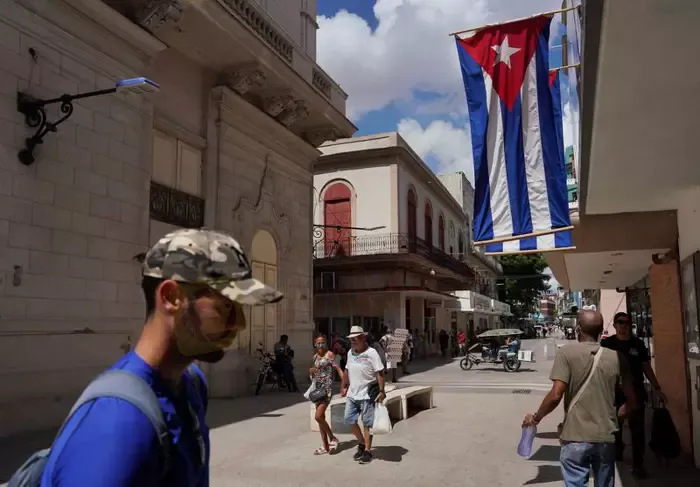简体中文
繁體中文
English
Pусский
日本語
ภาษาไทย
Tiếng Việt
Bahasa Indonesia
Español
हिन्दी
Filippiiniläinen
Français
Deutsch
Português
Türkçe
한국어
العربية
Cuba more than quadruples dollar/peso exchange rate
Abstract:Cuba announced it will begin purchasing on Thursday dollars and other convertible currencies at nearly five times the current rate in an effort to undercut the informal money market and capture the funds.

Central Bank President Marta Wilson Gonzalez, appearing on state-run television on Wednesday evening, said the state-run banking system had set a new rate of 120 pesos to the dollar, compared to the official fixed rate of 24 pesos, and 115 pesos on the informal market, according to independent online news outlet El Toque tracker, the most watched in the communist-run country.
Gonzalez said the new rate would float and did not apply to most activities of the state-dominated economy which would still operate at the fixed rate in effect for more than 18 months.
Cuba stopped accepting dollars in 2020 citing U.S. sanctions and stopped selling convertible currency for pesos to the public soon after, stating it simply did not have the cash.
Economy Minister Alejandro Gil, appearing with the central bank president on Wednesday, said in the near future he hoped to resume currency exchanges, but the first step would be capturing the informal market.
“Today there is a high level of foreign currency that is entering the country that is not being captured by the national financial system,” he said.
Hit by harsh new U.S. sanctions, the pandemic and current high international prices for goods and shipping, the near-bankrupt, import-dependent economy grew 1.3% last year after declining 10.9% in 2020. Gil said a gradual if slow recovery continued without giving figures.
Shortages of food, medicine, fuel and now electricity have led to scattered protests in recent months.
Pavel Vidal, a former Cuban central bank economist who teaches at Colombias Pontificia Universidad Javeriana Cali, said the measure addressed a major complaint of tourists who exchanged money at the fixed government rate in hotels and then discovered outside on the street everything is pegged at the informal rate.
Vidal said it would also benefit “the private sector which often receives foreign currency from tourists and that the banks will once more accept and exchange physical dollars at 120 which unlocks one of the major impediments that remittances had as they were fetching 24 pesos.”

Disclaimer:
The views in this article only represent the author's personal views, and do not constitute investment advice on this platform. This platform does not guarantee the accuracy, completeness and timeliness of the information in the article, and will not be liable for any loss caused by the use of or reliance on the information in the article.
Read more

CySEC Revokes UFX Broker Licence as Reliantco Halts Global Operations
The Cyprus Securities and Exchange Commission (CySEC) has officially withdrawn the Cyprus Investment Firm (CIF) licence of Reliantco Investment Limited, the operator of UFX.com. This decision followed a six-month period during which the company failed to provide any investment services or perform investment activities.

Elon Musk Sparks Debate Over Presidential Power and Federal Reserve Independence
Elon Musk has voiced his support for the controversial idea that United States presidents should have a role in shaping Federal Reserve policies. This endorsement aligns with recent remarks from President-elect Donald Trump, who has hinted at revisiting the central bank's independence, a long-held tradition in the nation's financial governance.

Consob Sounds Alarm: WhatsApp & Telegram Users Vulnerable to Investment Scams
Italy's financial regulator, Consob, has raised alarms over an increase in fraudulent schemes targeting investors through mobile messaging platforms such as WhatsApp and Telegram.

Crypto 101: Coins vs Tokens
For those new to the world of cryptocurrency, terms like "coin" and "token" may seem interchangeable. However, understanding the distinction between these two digital assets is crucial for navigating the crypto landscape. Both coins and tokens serve as integral components of blockchain ecosystems, yet they differ in their functionalities, use cases, and the technologies underpinning them.
WikiFX Broker
Latest News
Tokyo Police Arrest 4 for Unregistered FX Trading Scheme
BSP Shuts Down Uno Forex Over Serious AML Violations
ACY Securities Expands Global Footprint with South Africa Acquisition
Rupee gains against Euro
WikiEXPO Global Expert Interview: The Future of Financial Regulation and Compliance
DFSA Warns of Fake Loan Approval Scam Using Its Logo
Consob Sounds Alarm: WhatsApp & Telegram Users Vulnerable to Investment Scams
CySEC Revokes UFX Broker Licence as Reliantco Halts Global Operations
Bitcoin ETF Options Get Closer to Reality with CFTC Clarification
Peso Depreciation to 59:$1 Likely Amid Strong Dollar Surge
Currency Calculator


